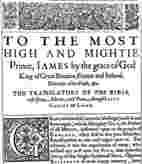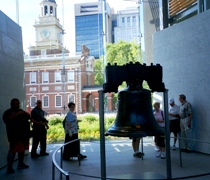The most published book in the world celebrates its 400th anniversary.

Soon after March 24th 1603, when James VI, King of Scots, inherited the English crown, a crowd of Puritans approached him with their petition. They requested that all traces of Catholicism were removed from the Church of England service. Upon thorough consideration of their request the King rejected the whole document and even threatened to “harry the Puritans out of the land, or else do worse”.
But he surprisingly agreed to commission a new translation of the English Bible — a last-minute added wish by one of the Puritans, known as Dr. John Rainolds, President of Corpus Christi College in Oxford. The 47 translators were selected based exclusively on their scholarly reputation without regard of religious convictions, thus about a quarter of them were Puritans.
Though it is officially called the Authorized Version, King James never technically authorized this new translation of the Bible into English. It is possible to assume that this version which is now firmly connected with the King’s name was called “authorized” in opposition to the two preceding attempts made by the early dissidents – Wycliffe and ill-fated Tyndale. This translation meant to play an important role in uniting all Protestant Englishmen despite their religious differences, the endeavor started by Elizabeth I with The Act of Uniformity in 1559.

As Leland Ryken puts it: “The King James style is a paradox: it is usually simple in vocabulary while majestic and elevating in effect. However imitated or parodied, the language is dignified, beautiful, sonorous and elegant.” *
These words capture well the impression King James Bible makes on all who love the English language.
Perhaps nothing influenced the English and eventually American literature and literary language more than KJB. Edmund Wilson thought that “other cultures have felt its impact, and none — in the West, at least – seems quite to accommodate to it. Yet we find we have been living with it all our lives”**
Small wonder: first [pilgrim] settlers in America were people of the Bible, and many early American towns carry Biblical names, such as Salem, Mass, 1626; Bethel, Conn, 1700; Shiloh, NJ, 1705; Ephrata, Penn, 1732; Nazareth, Penn., 1740; Emmaus, Penn.,1740; Bethlehem, NH, 1774, etc. Seven towns named Galilee, fifteen named Trinity, fourteen – St. Joseph, including one in Missouri; as well as St. Mary, MO — one of the nineteen American towns with this name.
Everyday idiomatic usage is replete with hidden or obvious direct quotations from the KJB. Here are a few common examples:
At his wit’s end – Psalms, 107:27
God save the king – The First Book of Samuel, 10:24
My brother’s keeper – Genesis, 4:9
The land of the living – Job, 28:13
The root of the matter– Job 19:28
Fell flat on his face — Numbers 22:31
The salt of the earth– Matthew 5:13
Labor of love — Thessalonians 1:2, 1:3:
A two-edged sword—Proverbs 5:4
White as snow — Daniel 7:9:
A drop in the bucket — Isaiah 40:15
A wolf in sheep’s clothing — Matthew 7:15
Woe is me – Job 10:15
Beat swords into ploughshares — Isaiah II
In the twinkling of an eye—1 Corinthians 15:52
Sign of the times — Matthew 16:3
The spirit is willing but the flesh is weak— Matthew 26:41
You reap what you sow — Galatians VI
Physician heal thyself — Luke 4:23
Man does not live by bread alone — Deuteronomy 8:3
A broken heart — Psalms 34:18
It’s better to give than to receive — Acts 20:35
Good Samaritan — Luke 10:30/33
Feet of clay — Daniel 2: 31-33
Don’t cast your pearls before swine — Matthew 7:6,
A voice crying in the wilderness– John 1:23
Awake and sing– – Isaiah 16:19
We also encounter these quotations in our everyday lives, as I did while at the ALA conference in Philadelphia last year where I took this picture.

“Proclaim Liberty throughout all the Land unto all the Inhabitants thereof” (Leviticus 25:10) – The Liberty Bell in the Liberty Bell Center, Philadelphia.
Sources:
*Leland Ryken. How We Got the Best-Selling Book of All Time. WSJ, August 27, 2011
**Robert Alter. Pen of Iron: American Prose and the King James Bible. Princeton U Press, 2010.
John Bartlett. Familiar Quotations: A Collection of passages, Phrases and Proverbs Traced to Their Sources in Ancient and Modern Literature. Boston, 1855.
Highway 70 from Columbia, MO to St. Louis.